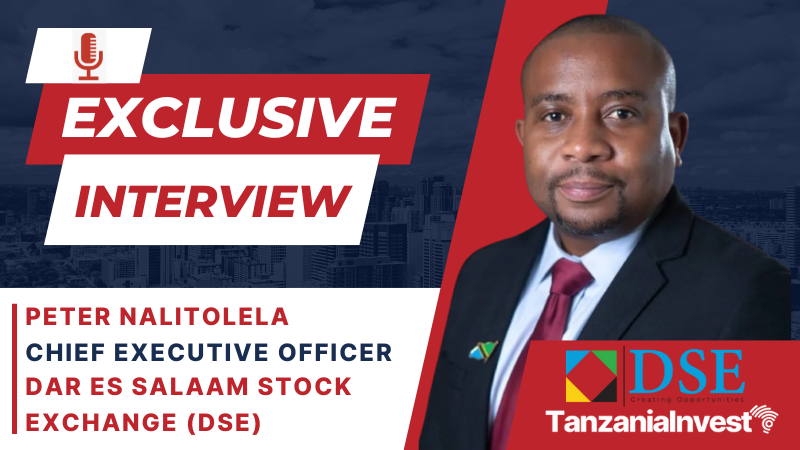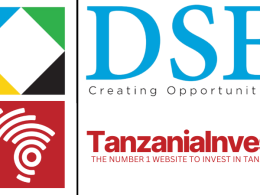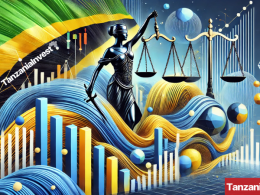In this exclusive interview with TanzaniaInvest, Peter Nalitolela, Chief Executive Officer of the Dar es Salaam Stock Exchange (DSE), offers invaluable insights into Tanzania’s capital markets and investment landscape.
As part of the recently announced partnership between TanzaniaInvest and DSE, this in-depth conversation provides readers with valuable insights into the stock exchange’s history, current performance, and future prospects.
Nalitolela discusses the high potential for expanding the DSE’s user base, strategies to attract foreign investors, the growing role of funds and collective investment schemes, and how technology is being leveraged to increase market accessibility. He also highlights emerging sectors and opportunities for both local and international investors.
This interview is essential reading for anyone interested in Tanzania’s economic development, providing a comprehensive look at the stock exchange’s evolution, current trends, and future prospects. It offers a unique window into the workings of the country’s primary securities exchange and its pivotal role in driving economic growth.
TanzaniaInvest: Could you tell us about your career path before becoming CEO of the Dar es Salaam Stock Exchange (DSE)?
Peter Nalitolela: Before being appointed on August 1st, 2024, I spent years in the banking sector first with Barclays Group, which later became Absa Tanzania, primarily in treasury and global markets. I then worked at the National Bank of Commerce (NBC) as Director of Treasury and Global Markets. My career has spanned investment management, pension funds, power and energy, telecommunications, and now, the stock exchange.
TanzaniaInvest: Can you summarize the history of the DSE and its development?
Nalitolela: The DSE was established in 1996 during Tanzania’s transition from a centrally planned economy to a market economy. Initially, the exchange was used to facilitate the privatization of government-owned companies, such as the National Microfinance Bank (NMB). Cross-listings from Kenya followed, and we currently have six Kenyan companies on the DSE.
However, the exchange faced a period of stagnation until recent years, with new companies being listed and corporate bonds taking off. In addition, a law was introduced requiring telecommunications companies to float 25% of their shares, but only Vodacom Tanzania has complied.
“We have observed an increase in corporate bonds, which have proven to be a significant development in this market.”
We have observed an increase in corporate bonds, which have proven to be a significant development in this market. We are also moving towards incorporating ESG principles—focusing on environmental, social, and governance factors—into our sustainability bonds.
Tanzaniainvest: Why do you think bonds are preferred to equities?
Nalitolela: Bonds are generally easier to understand than equities because they offer fixed income; investors receive regular coupon payments and the return of principal at maturity. In contrast, equities come with more risks, as business performance can fluctuate. Unfortunately, the public often expects consistent growth, which hasn’t always been the case.
Recent IPOs have disappointed many investors due to anticipated price increases that did not materialize, and some companies have even faced delisting. While some have managed to recover, the mixed results of recent IPOs have left a negative impression among investors. Ultimately, the certainty provided by fixed-income investments contrasts sharply with the
unpredictability of equities.
TanzaniaInvest: Are there any specific sectors performing better than others at DSE?
Nalitolela: Yes, the financial services sector has been the standout performer in our markets. If you examine the market capitalization over various time frames, there has been a 2.8% increase in the last month alone.
“The financial services sector has been the standout performer in our markets […] particularly the largest banks.”
Over three months, the market cap has grown by 4%, and year-to-date, we see an overall increase of nearly 4% since January 1. Comparing October of last year to this October, the total market has increased by 22%.
This growth is largely driven by the financial services sector, particularly the largest banks, which hold almost half of the banking market share.
TanzaniaInvest: Are you looking to attract more companies to list on the DSE to stimulate the appetite of investors?
Nalitolela: Yes, one of the strategic pillars of our 2023-2027 plan is making the DSE the preferred avenue for capital raising and listing. We aim to attract more local companies—especially family-owned businesses—to consider issuing bonds as a way to raise capital without losing control over their operations.
“One of the strategic pillars of our 2023-2027 plan is making the DSE the preferred avenue for capital raising and listing.”
Our strategy targets large corporations, Tanzanian private companies, and SMEs. Many large multinational companies operating in Tanzania are already listed in their home markets and are reluctant to list their subsidiaries here.
For Tanzanian private companies, particularly family-owned businesses, the fear of losing control is a significant barrier to listing. We encourage them to issue bonds instead of equity, allowing them to raise capital without giving up ownership.
We are also engaging with listed companies to consider stock splits. A stock priced at TZS 10,000, for example, could be split into five shares priced at TZS 2,000 each. This would make the stock more affordable and increase trading volume. However, companies are often reluctant due to the administrative burden of managing more shares. We are continuing these discussions to encourage more companies to pursue stock splits.
“The Enterprise Growth Market (EGM) allows smaller companies and startups to raise capital even if they do not meet the profitability history required for the main market.”
We are also working to attract SMEs through the Enterprise Growth Market (EGM). The EGM allows smaller companies and startups to raise capital even if they do not meet the profitability history required for the main market. Companies with strong business plans can use the EGM to access capital and grow.
TanzaniaInvest: Tanzanians represent the lion’s share of investors at DSE. What is your estimate of the potential pool of local investors?
Nalitolela: An estimate of investors can be derived from the total adult population, which is around 30 to 33 million, with recent voter registration data indicating approximately 32.8 million eligible voters. The 2023 Financial Sector Deepening Tanzania (FSDT) report highlights that financial inclusion has increased, with 22.2% of the population using banking services. This suggests that around 7 million people are engaged with financial services. However, the current number of Central Securities Depository (CSD) accounts is only about 611,000, indicating significant growth potential.
“Around 7 million people are engaged with financial services. However, the current number of Central Securities Depository (CSD) accounts is only about 611,000, indicating significant growth potential.”
TanzaniaInvest: How do you explain such low participation of Tanzanians at DSE?
Nalitolela: The level of participation at DSE is indeed notably low, currently standing at less than 10% of the bankable population, which raises significant concerns. To address this issue, it is crucial to recognize the role of awareness. My observations indicate that even individuals with university degrees or diplomas are aware of the DSE yet still seek clarification regarding its functions. Market awareness is gradually increasing, but we hope to see more substantial improvement.
TanzaniaInvest: What about attracting more foreign investments to the DSE?
Nalitolela: One major challenge is foreign exchange (FX) liquidity. Global macroeconomic conditions have created difficulties for foreign investors in converting and repatriating their earnings, making them cautious. Furthermore, currency depreciation can erode profits when converted back to foreign currencies. Currently, Tanzania’s capital account is not fully open—foreigners can invest in equities and corporate bonds, but their participation in government bonds is limited to residents of the East African Community (EAC) and Southern African Development Community (SADC).
“We are lobbying with the Bank of Tanzania (BOT) and the Capital Markets and Securities Authority (CMSA) to review regulations […] to fully open up the market to foreign investors.”
This is why we are lobbying with the Bank of Tanzania (BOT) and the Capital Markets and Securities Authority (CMSA) to review regulations. We propose to fully open up the market to foreign investors, particularly for government bonds. This would allow investors to move funds into government bonds during times of FX volatility, providing them with an alternative to exiting the market.
TanzaniaInvest: What role do you see for funds and collective investment schemes in growing the DSE?
Nalitolela: We are working to attract more funds and collective investment schemes to the DSE. Recently, we’ve seen increased activity from fund managers, including the launch of a Sharia-compliant fund and a fixed-income fund.
“Collective investment schemes are growing, and we see this as a significant area for future growth. We are encouraging fund managers to introduce exchange-traded funds (ETFs).”
We are encouraging fund managers to introduce exchange-traded funds (ETFs), which would allow investors to pool their money into a fund that tracks a group of stocks or bonds, simplifying diversification. We’ve also had positive discussions with private equity and venture capital forums. Collective investment schemes are growing, and we see this as a significant area for future growth.
TanzaniaInvest: How is technology being used to expand the reach of DSE products?
Nalitolela: We recently revamped our mobile trading platform, allowing investors to place orders 24/7. International card payments, such as Visa and MasterCard, are now supported, which makes it easier for diaspora investors to participate. The app also includes features like minor and joint accounts, and investors can directly subscribe to IPOs through the platform.
“We recently revamped our mobile trading platform, allowing investors to place orders 24/7. International card payments, such as Visa and MasterCard, are now supported.”
To further expand our reach, we are partnering with banks and mobile network operators. By integrating DSE services into their platforms, we can reach more Tanzanians who already use these apps for daily transactions. This makes investing in the stock exchange more accessible, especially for people in rural areas who may not have easy access to stockbrokers.
We are also developing fractional share trading. This will allow investors to purchase portions of high-value shares. For example, if a stock costs 10,000 shillings, investors could buy a fraction of it through a broker. This initiative will make the stock market more accessible to retail investors who may not have the means to buy full shares of expensive stocks.
TanzaniaInvest: What is your final message to investors regarding the future of the DSE?
Nalitolela: The DSE offers an opportunity to participate in Tanzania’s economic growth. The country’s GDP has been growing consistently at more than 5% per year, and sectors like green energy, the blue economy, and infrastructure projects are emerging. Many of these companies will eventually come to market, providing investment opportunities. For local investors, the DSE is a gateway to prosperity. For international investors, the DSE serves as a benchmark for Tanzania’s economic performance. We invite investors to take part in this growth, whether through equities or bonds.








